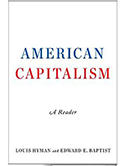CornellX - HIST151X
American Capitalism: A History
Spring / 2015
March 23, 2015 – May 17, 2015
About the course
No history is as essential to "get right" as the history of capitalism. Nearly all of our ideas about how to create human progress come from how we interpret the economic history of the last 500 years. The repeated crises of just the last decade have reminded us how much capitalism continues to change even as its basic features — wage labor, credit markets, private property, entrepreneurs — remain constant.
Capitalism has a global history, but in that story the U.S. has an exceptional place. American Capitalism will show how the U.S. has gone from backwater colony to global power, revealing enduring lessons for businesspeople, policymakers, and everyone else about what is possible in capitalism's on-going development.
Professors
Edward Baptist, Associate Professor, Department of History
Louis Hyman, Assistant Professor, Department of Labor Relations, Law, and History

Dr. Edward E. Baptist
Edward Baptist is an associate professor of history at Cornell University. His scholarship is centered on the 19th-century United States and, more broadly, the creation of the modern world. One specific research focus is the massive growth of slavery in the U.S. between the American Revolution and the Civil War, an expansion that shaped the emergence of both American and global capitalism. He teaches a wide variety of courses on U.S. political history, the history of slavery and, of course, the history of American capitalism.
Baptist studied at the Georgetown University School of Foreign Service and received his PhD in history from the University of Pennsylvania in 1997.
Dr. Louis Hyman
Louis Hyman is an assistant professor in the Department of Labor Relations, Law, and History at Cornell University. His research interests focus on the history of capitalism in the United States. His first book, Debtor Nation: The History of America in Red Ink, focused on the history of the political economy of debt and was selected as one of the 2011 Choice Top 25 Outstanding Books of the Year. His second book, Borrow: The American Way of Debt, explained how American culture shaped finance and in turn how finance shaped culture.
A former Fulbright scholar, Hyman earned a BA in history and mathematics at Columbia University, and received his PhD in American history in 2007 from Harvard University.
Are there prerequisites?
There is no formal prerequisite. This course is designed to be accessible for people without a strong background in U.S. history. Nevertheless, we make reference to many people, locations, events, or developments that may be unfamiliar to some students. If you do not understand something referred to in the class, we recommend you do a quick online search for some background information.
- Wikipedia is a very helpful source for a quick definition or description of most of the material in this course. It can help you answer most factual questions you might have.
- Digital History (http://www.digitalhistory.uh.edu) is a website that can serve as an online text book if you need a stronger grounding in U.S. history.
- For more difficult questions, you can post a question on the discussion board where your fellow students may be able to help you.
What will be covered in this course?
This course develops chronologically, beginning with a brief overview of the pre-capitalist world and continuing through the economic crisis of 2008. The focus will be on the development of capitalism in the United States, but we will pay close attention to how that process was shaped by global considerations. The course is arranged into the following sections:
- Introduction: Considering Capitalism Historically
- Capitalism Comes to America: 1492 – 1787
- Making Capitalism American: 1787 – 1877
- Making American Capitalism Corporate: 1877 – 1945
- Making American Capitalism Global: 1945 – 2008
- Conclusion: Assessing Capitalism Historically
Upon successful completion of this course students will be able to:
- Describe the development of American capitalism as a historical process that emerged from political choices, business cultures, entrepreneurial decisions, and technological transformation.
- Recognize and criticize the policy programs derived from different analyses of capitalism.
- Describe how government policies contribute to market success and failure.
- Exercise reading, writing, and analytical skills vital to historical interpretation.
- Display a critical sense of how capitalism is not a static economic system but changes over time.
What are the students expected to do for successful completion of the course?
To earn certification students must receive a passing grade of 60% or more will earn certification. Students will be graded on quiz questions that appear after videos and readings (100%).
- Watch lecture videos and take quizes. Professors Hyman and Baptist provide video lectures that contain most of the course content. Complete quiz questions. Most videos will end with a quiz question, designed to assess how well you can identify the main interpretive claims made by the professor. Quiz formats will be either: 1) multiple choice, 2) true/false, or 3) drag and drop. Point totals are specified for each question.
- Do the readings. There are readings assigned for most subsections. The readings are primary sources that you will be asked to analyze.Each reading will be followed by a quiz question and an invitation to discuss the reading.
- Participate in Discussion Forums. Once per subsection (sometimes more), you will be invited to post and respond to posts on designated topics in our discussion forums. Discussions are a great opportunity to help you develop historical analysis skills and to help you articulate historical arguments and interpretations. Here, you can also post and answer questions regarding the course. For more information on Discussion Forums, please refer to the Discussion Forum details here.
Optional Course Reader
* Recommended Optional Readings have been provided in response to student requests. For every topic in the course, there is a wide array of historical sources. These readings provide a deeper view of weekly topics. They are not required to complete course work, but if you are interested, they will reward your time.
Course Schedule
* While we recommend completing quiz questions on a weekly basis, the due date on all quiz questions has been set to the last week of the course to accommodate late-joining students.
| WEEK | SECTION | SUBSECTION | ASSIGNMENTS |
|---|---|---|---|
| Week 1 March 23 |
|
|
READ: Adam Smith, Wealth of Nations, Chapters 1 and 2 |
| Week 2 March 30 |
Capitalism Comes to America: 1492 – 1787 |
|
READ: Olauduh Equiano, Interesting Narrative (excerpts) READ: Alexander Hamilton, Report on Manufactures (excerpts) |
| Week 3 April 6 |
Making Capitalism American: 1787 – 1877 |
|
READ: Charles Ball, Slavery in the United States (excerpts) READ: Howard, "The Bay State Strike", New York Times |
| Week 4 April 13 |
Making Capitalism American: 1787 – 1877 |
|
READ: Solomon Northup, Twelve Years a Slave, (Buffalo, 1853)(excerpts) READ: Andrew Jackson, Veto Message |
| Week 5 April 20 |
Making American Capitalism Corporate: 1877 – 1945 |
|
READ: Jane Addams, "Subjective Necessity for Social Settlements," in Twenty Years at Hull House READ: Andrew Carnegie, "Wealth" |
| Week 6 April 27 |
Making American Capitalism Corporate: 1877 – 1945 |
|
READ: Franklin Delano Roosevelt, "Second Fireside Chat" |
| Week 7 May 4 |
Making American Capitalism Global: 1945 – 2008 |
|
READ: Transcript of the Marshall Plan |
| Week 8 May 11 |
Making American Capitalism Global: 1945 – 2008 |
|
Additional opportunities:
Resource hunt. Controlling resources has been a very important part of the development of U.S. capitalism. In this course we have designed ways for you to engage in your own hunt for resources. We have identified five themes that recur throughout the course. For each theme (listed below), we have hidden an icon in some of the course videos on that theme. Details about the Resource Hunt will be introduced during the first week of class.
Themes: Consumption, Entrepreneurship, Finance, Labor, State power
Those who are successful will see their investment in time pay off by unlocking prizes!
Why Coordinated Universal Time (UTC)?
Because we have a worldwide audience, this course is timed using UTC. The current UTC date and time can be found on this website:
Certification
Students will receive points for correctly answered quiz questions and for Participants who achieve the passing mark of 60% or more will earn a certificate of mastery. These certificates will indicate you have successfully completed the course, but will not include a specific grade. Certificates will be issued by edX under the name of CornellX. These certificates are issued free of charge.
Honor Code and Academic Integrity
This course is offered online and we encourage collaboration and help between students, but please avoid asking for and posting final answers. Violations of the honor policy undermine the purpose of education and the academic integrity of the course. We expect that all work submitted will be a reflection of one's own original work and thoughts. Please review our collaboration and forum guidelines, available on the course handouts page, to understand how we expect our students to conduct themselves in this course. Additionally all students are expected to follow the edX Honor Code, available at https://www.edx.org/honor
